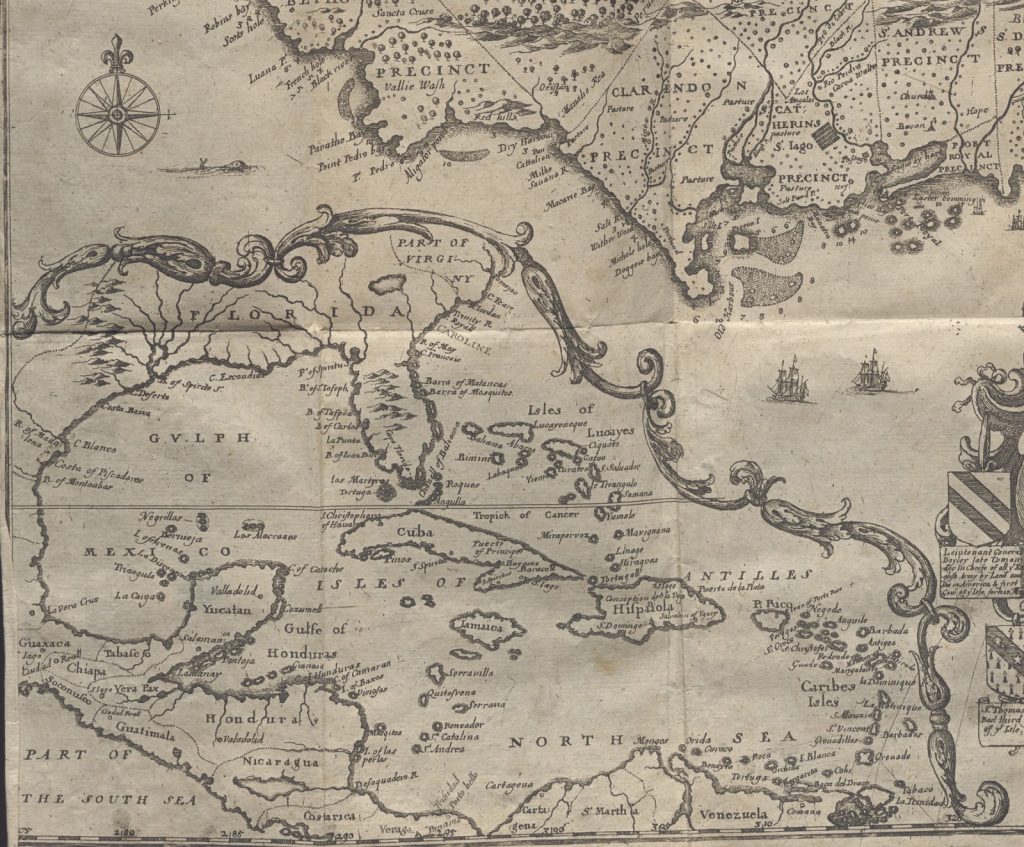 Conference organized by Carla Gardina Pestana (University of California, Los Angeles) and Gabriel de Avilez Rocha (Brown University)
Co-sponsored by the Joyce Appleby Endowed Chair of America in the World
The diverse peoples who converged on the Caribbean before 1700 held a range of differing beliefs, ideas about the natural world, and understandings of social, political, and spiritual order. Considering how Indigenous, African, and European systems of thought and faith clashed, adapted, and transformed will be the focus of this second meeting. We invite participants to consider how culturally specific systems of knowledge were expressed and transformed under emergent rubrics of what would become known as religion, science, and law. We will likewise reflect on how these ideas animated the creation and maintenance of institutions of governance and knowledge production both in the Caribbean and extending beyond it. This conference grants an opportunity to weigh how the globalization of the early Caribbean marked historical changes in beliefs and ideas but also witnessed continuities that cut across the 1492 divide. In the process, a multitude of convictions about spiritual, natural, corporal, social and political order helped shape (and were reshaped by) encounters in the Basin.
Speakers
Larissa Brewer-García, University of Chicago
Pablo F. Gómez, University of Wisconsin, Madison
Alexander Mazzaferro, University of California, Los Angeles
Elise A. Mitchell, Swarthmore College
José R. Oliver, Institute of Archaeology, University College London
Daniel Rafiqi, Ahmanson-Getty Postdoctoral Fellow
Jessica Vance Roitman, Vrije Universiteit Amsterdam
Casey Schmitt, Cornell University
Owen Stanwood, Boston College
Miguel A. Valerio, Washington University in St. Louis
Conference organized by Carla Gardina Pestana (University of California, Los Angeles) and Gabriel de Avilez Rocha (Brown University)
Co-sponsored by the Joyce Appleby Endowed Chair of America in the World
The diverse peoples who converged on the Caribbean before 1700 held a range of differing beliefs, ideas about the natural world, and understandings of social, political, and spiritual order. Considering how Indigenous, African, and European systems of thought and faith clashed, adapted, and transformed will be the focus of this second meeting. We invite participants to consider how culturally specific systems of knowledge were expressed and transformed under emergent rubrics of what would become known as religion, science, and law. We will likewise reflect on how these ideas animated the creation and maintenance of institutions of governance and knowledge production both in the Caribbean and extending beyond it. This conference grants an opportunity to weigh how the globalization of the early Caribbean marked historical changes in beliefs and ideas but also witnessed continuities that cut across the 1492 divide. In the process, a multitude of convictions about spiritual, natural, corporal, social and political order helped shape (and were reshaped by) encounters in the Basin.
Speakers
Larissa Brewer-García, University of Chicago
Pablo F. Gómez, University of Wisconsin, Madison
Alexander Mazzaferro, University of California, Los Angeles
Elise A. Mitchell, Swarthmore College
José R. Oliver, Institute of Archaeology, University College London
Daniel Rafiqi, Ahmanson-Getty Postdoctoral Fellow
Jessica Vance Roitman, Vrije Universiteit Amsterdam
Casey Schmitt, Cornell University
Owen Stanwood, Boston College
Miguel A. Valerio, Washington University in St. Louis
About the 2024–25 Core Program: Early Global Caribbean The Caribbean has been a site of global interaction and dramatic change for centuries. Although consideration of the impact of the forces of globalization on the region often focuses on the eighteenth-and-nineteenth-centuries era of sugar and slaves, Caribbean people’s engagement with those forces long predates the period of the plantation complex. Yet a concerted reckoning with earlier global dimensions of Caribbean history, especially one that considers recent advances in scholarly understandings of Indigenous and early colonial histories of the region, has yet to be accomplished. This cycle of conferences and events will serve as an important catalyst for inter-disciplinary dialogue that will move Caribbean studies towards centering transformations in the region’s societies, cultures, ideas, and environments during a period that is conventionally assumed to be prefatory to the histories that followed in its wake.
The conference is free to attend with advance registration. It will be held in-person at the Clark Library and livestreamed on the Center’s YouTube Channel. The registration form will post here approximately a month in advance, and registration will close on Monday, February 17 at 5:00 p.m. No registration is required to watch the livestream. Seating is limited at the Clark Library; walk-in registrants are welcome as space permits.
Image: Richard Blome’s The present state of His Majesties isles and territories in America… (London: Printed by H. Clark, for D. Newman, 1687). Clark Library Rare Book Stacks, E162.B65 1687*